- Transition «
Russian Interference in the 2016
Presidential
Election (Post Inauguration)
See also: Post Election Developments (Nov. 17, 2016-Jan. 11, 2017) | Election Integrity
U.S. Department of Justice: Special Counsel's Office
Senate Select Committee on Intelligence (SSCI)
House Permanent Select Committee on Intelligence (HPSCI)
Senate Committee on the Judiciary, Subcommittee on Crime and Terrorism
House Committee on Oversight & Government Reform - Democrats
Russian Interference in the 2016 Presidential Election
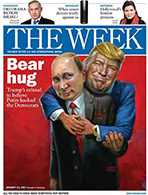
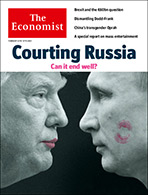
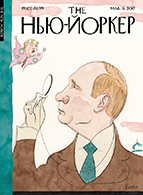
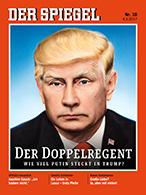
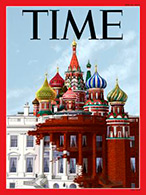
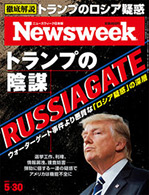
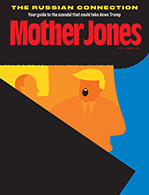
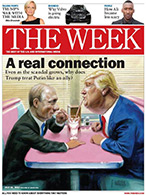
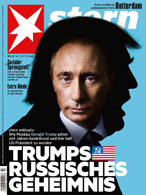
[updated Sept. 14, 2018] Questions about Russian interference in the 2016 presidential election have dogged President Trump starting in the transition and throughout the first year of his adminstration. The $64,000 question is whether there was collusion between Trump's campaign and the Russians. Trump has steadfastly refuted the allegations as a "witch hunt." Trump son-in-law Jared Kushner has been reported as arguing that the campaign was too disorganized to collude with Russia. To those who covered the campaign, that actually sounds believable. Investigations have been going on several tracks: congressional committees have been holding open and closed hearings, and special counsel Robert Mueller has been working in the background since his appointment on May 17 2017.
Even if collusion is completely disproven, many serious questions have been raised about Trump's business dealings, and whether some of those dealings may have affected policy decisions or even if Trump could be beholden to the Russians (+). Some have called for a separate investigation focusing on those matters (>), but the Mueller investigation and congressional investigations center on the very serious matter of Russian interference.
Investigations Begin to take Shape
On Feb. 13, 2017 National Security Advisor Lt. Gen. Michael Flynn (ret.) announced his resignation noting that, "I inadvertently briefed the Vice President Elect and others with incomplete information regarding my phone calls with the Russian Ambassador." On Mar. 2, 2017 following reports that he had met a couple of times with the Russian Ambassador during the campaign, Attorney General Jeff Sessions announced he would recuse himself "from any matters arising from the campaigns for President of the United States."
Meanwhile, on Capitol Hill investigations took shape. Most notably, the U.S. Senate Select Committee on Intelligence (SSCI) and U.S. House Permanent Select Committee on Intelligence (HPSCI) started work on the matter. The Senate Judiciary Subcommittee on Crime and Terrorism, chaired by Sen. Lindsey Graham (R-SC), looked into the issue, and Rep. Elijah Cummings (D-MD), ranking member of the House Oversight and Government Reform Committee, has been active on the subject as well.
The Federal Bureau of Investigation, under Director James Comey, was also conducting an investigation, confirmed by Comey in March 20 testimony. However, on May 9 President Trump fired Comey, ostensibly and ironically based on his handling of the investigation of Clinton's emails. The move set off a furor, leading Democrats to renew calls for an independent special prosecutor. On May 17 Deputy Attorney General Rod J. Rosenstein announced the appointment of former Department of Justice official and FBI Director Robert S. Mueller III as special counsel.
Trump has repeatedly dismissed any impropriety. For example, at his Feb. 16 press conference he declared "the whole Russian thing, that's a ruse." In a May 8 tweet he stated, "The Russia-Trump collusion story is a total hoax, when will this taxpayer funded charade end?" He and Republicans sought to play up DNC and Clinton campaign payments to the research firm Fusion GPS for the Christopher Steele dossier on Trump and Russia (>), and have questioned the impartiality of Mueller's investigation.
The drip, drip, drip of Russia related stories kept going. For example, the week of July 10, 2017 was dominated by news that Donald Trump Jr., along with Jared Kushner and Paul Manafort, had met with a Russian lawyer at Trump Tower in the heat of the campaign on June 9, 2016 as "part of Russia and its government's support for Mr. Trump (+)."
The Mueller Investigation
Special counsel Robert Mueller built a team of top-notch attorneys for an investigation that could drag on for years. (Recall that Ken Starr started investigating Whitewater in Aug. 1994, but his investigation grew to cover a whole range of matters and he issued a final report on Sept. 11, 1998). The view of Trump supporters toward the investigation is perhaps best expressed by former Gov. Mike Huckabee, who wrote on June 19, 2017 "Indeed, it’s smelling more and more like a hoax concocted to hamstring and delegitimize Trump while covering up Hillary’s embarrassing loss."
At some point in early to mid-July, Mueller convened a grand jury
(reported by the Wall Street Journal
on Aug. 3). On July 26 (reported on Aug. 9) the FBI raided former
Trump campaign manager Paul Manafort's home.
On Aug. 2 Trump did however sign the "Countering America's Adversaries Through Sanctions Act" (H.R. 3364) imposing sanctions on Iran, Russia and North Korea (+). Congress overwhelmingly passed the legislation, in part responding to Russia's hacking and disinformation campaign.
On Oct. 30 the first results of Mueller's investigation were revealed. Former Trump campaign chairman Paul Manafort and associate Rick Gates were indicted on 12 counts related to business dealings with the former Russia backed Ukranian leader Victor Yanukovich, including money laundering. Also on Oct. 30 news broke that George Papadopoulos, a Trump campaign foreign policy advisor, had pleaded guilty to lying about his contacts with Russians. According to the statement of the offense filed on Oct. 5, "Through his false statements and omissions, defendant Papadopoulos impeded the FBI's ongoing investigation into the existence of any links or coordination between individuals associated with the Campaign and the Russian government's efforts to interfere with the 2016 presidential election [PDF]."
On Dec. 1 another result of Mueller's investigation filled the news, as former National Security Advisor Michael Flynn pleaded guilty to making misleading statements to the FBI about conversations he had had with the Russian ambassador during the transition period. The charges were very narrow, but Flynn's agreement to cooperate with the Special Counsel's office could have far-reaching ramifications.
The next headline day came on Feb. 16, 2018, when 13 Russians and three Russian companies were indicted for interfering in the 2016 election (+).
Mueller's investigation has led to various referrals, the most significant of which involve Trump's longtime personal attorney Michael D. Cohen. The FBI executed search warrants of Cohen's office and hotel room on April 9, 2018. The Cohen strand started to draw attention with a Feb. 13 New York Times report that "he had paid $130,000 out of his own pocket to a pornographic-film actress." Conflicting stories about the payments of hush money to Stephanie Clifford (Stormy Daniels) and possible payments to others helped this story drag on into May.
Former New York Mayor Rudy Giuliani signed on to Trump's legal team on April 19, and has periodically added to the muddle around the investigation with pronouncements he has made during his many media appearances.
Investigations on Capitol Hill
On Capitol Hill, the SSCI investigation, led by chairman Sen. Richard Burr (R-NC) and ranking member Sen. Mark Warner (D-VA), seemed to be making the most progress. The HPSCI investigation was muddied early on by the behavior of committee chairman Rep. Devin Nunes (R-CA). On April 6, 2017 he appeared to recuse himself from the Russia investigation at least temporarily, but by June he was again playing an active role. In Jan.-Feb. 2018 there was tremendous buzz about a memo "with information on abuses of the Foreign Intelligence Surveillance Act" (+). The HPSCI released its final "Report on Russian Active Measures" (Mar. 22), on April 27, 2018, after having "interviewed 73 witnesses, conducted 9 hearings and briefings, reviewed approximately 307,900 documents, and issued 20 subpoenas." The report states that, "While the Committee found no evidence that the Trump campaign colluded, coordinated, or conspired with the Russian government, the investigation did find poor judgment and ill-considered actions by the Trump and Clinton campaigns."
The HPSCI led investigation was seen as compromised by partisanship of Rep. Nunes. (Partisanship was not limited to the Republicans. On April 20, 2018, the DNC filed a lawsuit, seen as having virtually no chance of success, charging "the Trump Campaign and its agents gleefully welcomed Russia's help. Indeed the Trump Campaign solicited Russia's illegal assistance, and maintained secret communications with individuals tied with the Russian government." [PDF])
A different view came from the SSCI, which on May 16, 2018 concurred with the Intelligence Committee Assessment ICA) that, "The Russian effort was extensive, sophisticated, and ordered by President Putin himself for the purpose of helping Donald Trump and hurting Hillary Clinton (+)."
The investigations on Capitol Hill did shine a spotlight on Russian
use of Facebook and social media (1, 2). In late September and the
beginning
of October it was
revealed that Russian groups had run ads seeking to influence the
election on the Facebook.
In
addition
to
Facebook,
Twitter
and
Google
also
came
under
scrutiny;
representatives
of
the
companies
testified
on
Capitol
Hill
on
Oct.
31-Nov.
1. One good outcome is that social media companies have had to
examine their practices and make changes in an attempt to address some
of the problems revealed (+).
"No Collusion"
The core question remains whether there was any collusion between the
campaign and Russians. Trump's insistent
and repeated response is "NO COLLUSION." In
a 30-minute interview
with the New York Times'
Michael S. Schmidt on Dec. 28, Trump made the point that there had been
"no collusion" 16 times. Throughout Trump has
charged
the
investigation is
a
"witch
hunt,"
and a "Democratic inspired thing." Text messages between FBI
counterintelligence agent Peter Strzok and FBI lawyer Lisa Page Trump
from the campaign period show their contempt and animosity towards
Trump; Strzok was removed from Mueller's investigation (+). Going
further, Trump and allies posit a
"deep state" conspiracy. For example, on Mar. 5, 2018 he tweeted,
"Why did the Obama Administration
start an investigation into the Trump Campaign (with zero proof of
wrongdoing) long before the Election in November? Wanted to discredit
so Crooked H would win. Unprecedented. Bigger than Watergate! Plus,
Obama did NOTHING about Russian meddling."
Certainly there is a lot of smoke. In Fall 2017 Trump and his
allies sought to
focus
attention on DNC and Clinton
campaign payments to the research firm Fusion GPS for the Christopher
Steele dossier, called for the DOJ to investigate Clinton (1,
2), created a hue and cry about the
memo, and generally raised questions
about the impartiality of Mueller's investigation (+).
In May 2018 there were reports that a FBI source / informant / spy
had several contacts
with Trump campaign advisors, leading Trump to tweet on May 20 with
characteristc bombast, "I hereby demand, and will do so officially
tomorrow, that the
Department of Justice look into whether or not the FBI/DOJ infiltrated
or surveilled the Trump Campaign for Political Purposes - and if any
such demands or requests were made by people within the Obama
Administration!"
One-Year Anniversary
May 17, 2018 marked the one-year anniversary of the Mueller
investigation. For the Trump Administration, the investigation is
an ever present, massive, dark, rumbling storm front on the
horizon. Big questions remained. Would Trump submit to an
interview with Mueller? WouldTrump try to fire Mueller or Deputy
Attorney General Rod Rosenstein, who is supervising the Mueller
investigation? How long would the investigation go on for?
Impeachment Talk
Talk of impeachment racheted up on Aug. 21, 2018 when a jury found
Manafort guilty of eight of 18 counts of bank and tax fraud, and
Trump's former attorney and fixer Michael Cohen reached a plea
agreement and pleaded guilty to eight counts including bank and tax
fraud and most importantly a
campaign finance violation (+).
While neither of these cases
concerned the question of collusion with Russia, it did not bode well
for Trump that two of his former top associates were now convicted
felons, and that Cohen directly implicated Trump in payments of hush
money in violation of campaign finance laws.
See also:
Matthew Cole, Richard Esposito, Sam Biddle and Ryan Grim. "Top-Secret NSA Report Details Russian Hacking Effort Days Before 2016 Election" The Intercept, June 5, 2017.
Craig Unger. "Trump's Russian Laundromat." The New Republic, July 13, 2017.
Jenna McLaughlin. "Kushner to Interns: Trump Team Too Disorganized to Collude With Russia." Foreign Policy, July 31, 2017.
On the matter of Russian hacking, an interesting wrinkle appeared in an Aug. 2017 article in the Nation questioning whether the hacking of the DNC might instead have been an internal leak. See: Patrick Lawrence. "A New Report Raises Big Questions About Last Year's DNC Hack." The Nation, Aug. 9, 2017. However, a countering article challenged Lawrence's findings. See: Brian Feldman. The Nation Article About The DNC Hack Is Too Incoherent to Even Debunk." New York, Aug. 10, 2016.
"How Facebook ads helped elect Trump." CBS News, Oct. 6, 2017.
Garrett M. Graff. "Bob Mueller's Investigation is Larger—and Farther Along—Than You Think." Wired, Feb. 5, 2018.
Jane Meyer. "Christopher Steele, The Man Behind the Trump Dossier." The New Yorker, Mar. 12, 2018.
Ed. Note:
Keep in mind that the Mueller investigation is only one of a number of investigations and legal proceedings entangling Trump. For example in mid-2018 lawsuits are progressing against the Trump Foundation (+), on possible violations of the emoluments clause (+), and even in a defamation case by former "Apprentice" contestant Summer Zervos.
| Legislative Branch |
Executive Branch |
|
| Jan.-Mar. 2017 - Investigations
Take Shape on Capitol Hill [Jan. 24 - SSCI Statement on
Inquiry into Russian
Intelligence Activities after Committee Meeting Today. Jan.
25 - Joint Statement on Progress of Bipartisan
HPSCI Inquiry into Russian Active Measures. Feb. 2 -
Joint Statement From Senators Graham And
Whitehouse On Investigation Into Russian Influence On Democratic
Nations' Elections. Mar. 1 - Intelligence Committee
Chairman, Ranking
Member Establish Parameters for Russia Investigation.] |
Jan. to ea. Mar. 2017 |
Feb. 13, 2017 - National Security Advisor Lt. Gen. Michael Flynn (ret.) announces his resignation Mar. 2, 2017 - Attorney General Sessions' Statement on Recusal |
| Mar. 20, 2017 - HPSCI Open Hearing on
Russian
active measures investigation Mar. 30, 2017 - SSCI Hearing: Disinformation: A Primer in Russian Active Measures and Influence Campaigns |
Mar.
|
|
| Apr. 6, 2017 - HPSCI and Chairman Nunes | Apr. |
[April 29, 2017 - Trump's 100th Day in office] |
| May 8, 2017 - Senate Judiciary
Committee, Subcommittee on Crime and Terrorism:
Russian Interference in the 2016 United States Election (>) |
May |
May 9, 2017 - Trump fires FBI Director James Comey May 17, 2017 - Appointment of Special Counsel Robert Mueller [PDF] |
| June 21, 2017 - HPSCI Russia Investigative Task Force Hearing
with Former Secretary of Homeland Security Jeh Johnson [PDF] June 21, 2017 - SSCI Hearing: US Election Security: Russian Interventions and the Outlook for 2018 and Beyond |
Jun. |
|
July 11, 2017 - Senate Judiciary Committee, Subcommittee on Crime and Terrorism: Concurrent Congressional and Criminal Investigations: Lessons from History (>) July 26-27, 2017 - Senate Judiciary Committee Hearing: Oversight of the Foreign Agents Registration Act and Attempts to Influence U.S. Elections: Lessons Learned from Current and Prior Administrations (1, 2) |
Jul. |
week of July 10, 2017 - reports of Donald Trump Jr. June 9, 2016
meeting with Russians at Trump Tower fill the news July 15, 2017 - White House announces Ty Cobb as special counsel on Russia matters July 2017 ...Mueller convenes grand jury [July 20, 2017 - Six-month anniversary of the Trump administration] |
| Aug. |
Aug. 2, 2017 - President Trump
signs the "Countering
America's Adversaries Through Sanctions Act" (H.R.
3364), imposing sanctions on
Iran, Russia and North Korea (+). |
|
| Sep. |
||
| Oct. 4, 2017 - Update on
Senate
Intelligence Committee’s inquiry into Russian
interference in the 2016 U.S. elections Oct. 31-Nov. 1, 2017 - Tech Execs Testify on Capitol Hill [Oct 31 - Senate Judiciary Committee, Subcommittee on Crime and Terrorism: "Extremist Content and Russian Disinformation Online: Working with Tech to Find Solutions" (>). Nov. 1 - SSCI: "Social Media Influence in the 2016 Elections." Nov. 1 - HPSCI: "Russia Investigative Task Force Open Hearing with Social Media Companies"] |
Oct. |
Oct. 30-31, 2017 - Special Counsel issues first indictments, plus Papadopoulos unsealed-reactions |
| Dec. |
Dec. 1, 2017 - Former National Security
Advisor Michael Flynn pleads guilty to making misleading statements to
the FBI. |
|
| 2018 |
||
| Jan. 29, 2018 - HPSCI votes to
release
much-hyped memo. |
Jan. |
|
| Feb. 2, 2018 - HPSCI releases memo. Feb. 13, 2018 - Leaders of intelligence agencies testify before the Senate Intelligence Committee. |
Feb. |
Feb. 16, 2018 - Special Counsel indicts 13 Russians for interfering in the 2016 election. Feb. 22, 2018 - Paul Manafort and Richard Gates indicted (>). |
| Mar. |
||
| Apr. 27, 2018 - HPSCI releases
its final "Report on Russian Active Measures" (Mar. 22), but
version is
much redacted by the
Intelligence Community. |
Apr. |
|
| May 19, 2018 - Senate Judiciary
Committee releases documents on the June 9, 2016 Trump Tower Meeting (>). |
May |
|
| Jun. |
||
| Jul. 3, 2018 - Senate Intelligence Committee releases
unclassified summary of findings on 2017 Intelligence Community
Assessment. |
Jul. |
Jul. 13, 2018 - Grand jury returns indictments against 12 Russian intelligence officers for hacking, starting in April 2016, into computers of "U.S. persons and entitites involved in the 2016 presidential election" and subseqently releasing stolen documents. Jul. 31, 2018 - Manafort trial begins at federal court in Alexandria, VA. |
| Aug. |
Aug. 20, 2018 - Jury finds
Manafort guilty of eight of 18 counts of bank and tax fraud. Aug. 20, 2018 - Trump's former attorney Michael Cohen reaches plea agreement and pleads guilty to eight counts: bank and tax fraud and a campaign finance violation. |
|
| Sep. |
Sep. 14, 2018 - Manafort reaches
plea agreement, pleads guilty to conspiracy against the United States
and conspiracy to obstruct justice, and agrees to cooperate with the
government. |
|
| Above list shows open hearings. |

